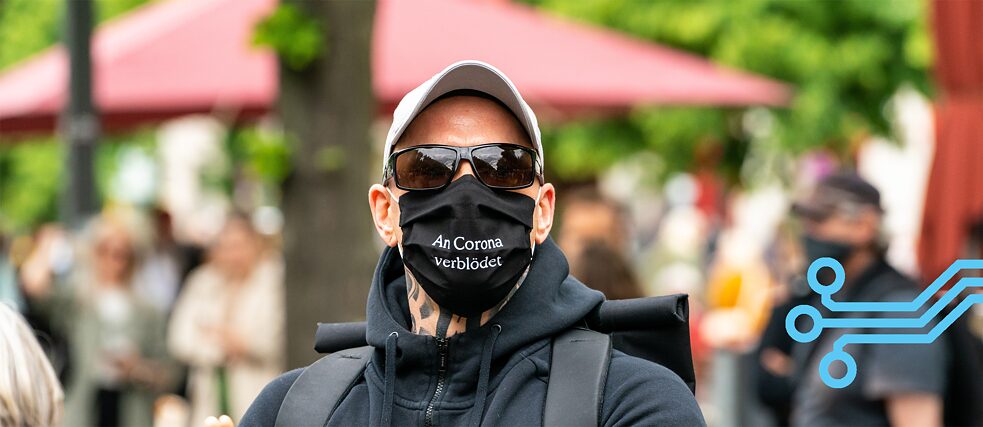Conspiracy myths
“It will wipe the smile right off your face”

People are more vulnerable to conspiracy ideologies when they fear a loss of control, making the corona pandemic the perfect storm. In an interview, political scientist and net activist Katharina Nocun explains how we should react when encountering people who subscribe to conspiracy theories.
By Eleonore von Bothmer
Ms. Nocun, you and your co-author Pia Lamberty published a book entitled “Fake Facts. How Conspiracy Theories Shape Our Thinking” in April 2020. Yet instead of conspiracy theories, you call them “conspiracy myths” or “ideologies”. Why?
Theories are a scientific concept. We assume that proponents will immediately withdraw or rethink a theory once it is proven wrong. But this is not what conspiracy ideologists do. A conspiracy myth is a narrative of a secret agreement among individuals or groups perceived as powerful. The alleged conspirators are endowed with certain abilities and authority. But such narratives may also target socially disadvantaged and marginalised groups, such as the anti-Semitic pogroms of the Black Plague in the Middle Ages. Another key component is that the conspirators are accused of having evil intent and seeking to deliberately harm others.
 Katharina Maria Nocun is a net activist and publicist. She blogs at kattascha.de and produces the "Denkangebot" podcast. Her first book "Die Daten, die ich rief" (The Data that I Summoned) was published in 2018. Her book " Fake Facts. Wie Verschwörungstheorien unser Denken bestimmen“ (Fake Facts. How Conspiracy Theories Shape our Thinking) was published by Quadriga in 2020.
| Photo: © Miriam Juschkat
So how can we know that it is not really a conspiracy?
Katharina Maria Nocun is a net activist and publicist. She blogs at kattascha.de and produces the "Denkangebot" podcast. Her first book "Die Daten, die ich rief" (The Data that I Summoned) was published in 2018. Her book " Fake Facts. Wie Verschwörungstheorien unser Denken bestimmen“ (Fake Facts. How Conspiracy Theories Shape our Thinking) was published by Quadriga in 2020.
| Photo: © Miriam Juschkat
So how can we know that it is not really a conspiracy?
There are real conspiracies, of course. In a democracy, it is important to keep close watch on what the secret services and governments are doing, what is happening in politics and the economy. The deciding factor is whether I can back up my claim to the truth with facts, or if I am just subscribing to an ideology, a closed world view. There is a difference between discussing hypotheses and adhering to a faith model.
When are people particularly prone to believing in conspiracies?
When people feel like control is slipping away from them – when they lose a job, for example, during political upheaval or a global pandemic – they tend to believe in conspiracy myths. This is what the studies have shown. The conspiracy myth can then serve as a kind of auxiliary construct. It does not necessarily give the believer a more positive world view, but it does give them a sense that there is a structure, a plan, and clearly guilty parties to point to.
What are some of the most common narratives?
There are a lot of conspiracy myths circulating in the medical field in particular. People who claim that vaccines are dangerous often cite conspiracy ideologies as proof. Some of these narratives suggest that there is a worldwide conspiracy of millions of doctors united in seeking to harm the world. This is not about facts; it has nothing to do with reality. But it leads some people to mistrust doctors, so they might instead consult a miracle healer even when they are seriously ill. Such anti-scientific attitudes can end in death.
Does the internet reinforce such trends?
There is a common misconception that the internet is what first gave conspiracy myths a boost. But during the Nazi era, the majority of the population believed in the myth of an international Jewish conspiracy, and so in a clearly anti-Semitic conspiracy narrative. This was the government position and taught in schools. There was no internet back then. It is true though that new media have made the phenomenon more visible and of course it is easier to create and quickly spread these narratives digitally.
How does this kind of world view become so real to people?
People who subscribe to conspiracy myths perceive the world somewhat differently. Most of us have an expert bias: we tend to trust people we think are experts more than we trust others. Studies have shown that conspiracists have a weaker expert bias, and in extreme cases they believe their neighbor as much as they would an internationally recognized expert.
How should we react to conspiracy ideologies on the net?
It is important to immediately post counter-statements on social networks and in group chats. We have to clearly stand up to racist and anti-Semitic statements and say “enough is enough!” This is really important, because conspiracy myths are also used to stir up hatred against targeted people, which can have serious consequences. Silence is often interpreted as agreement.
What exactly do you mean by “serious consequences”?
Many of the recent right-wing extremist assassins – in Hanau and Halle and also in Christchurch (New Zealand) – believed in conspiracy stories and used them justify committing murder. It has been shown that conspiracy myths are central to mobilising the radical right. We have to see this as a systematic problem that must be taken seriously. Conspiracy ideologues deliberately make people targets. We are now seeing this with corona. Scientists who receive death threats are less willing to speak out publicly. This does not enrich or further balanced, professional debate.
What should we do if friends suddenly express such beliefs?
Fact checks can help – there are very good ones for all aspects of corona. A private conversation can also be effective, and checking in, asking, “How are you really doing?” After all, we know that the feeling of losing control leads some people to suddenly start believing thing they would not otherwise tend to believe.
What are my chances of reaching someone who is absolutely convinced of a conspiracy?
It is difficult to get through to people who have fallen deeper in this parallel world of information and believe in a global scientific or press conspiracy. Fact checks come from the very people they believe are part of the conspiracy. At this point, advice centres recommend trying questions like: “Have you checked? Why do you think this medium is more reputable than this other one?” – and so encourage your counterpart to question their assumptions. Ideally, this can help stop or slow down radicalization. Often the belief in one conspiracy leads to the belief in other conspiracies, and at some point this results in a self-contained world view that is characterized by a black-and-white mindset.
Then there is the “tin-foil hat wearer” category, which some people find entertaining.
People like to laugh about the idea of chemtrails, which are supposedly substances released to poison us instead of just normal airplane condensation trails. But it is not particularly funny for a child who is not allowed to go outside as soon as a contrail is visible in the sky because their parents believe this stuff. They live in constant fear. Initially, people always want to hear about the funniest conspiracy stories, but not after a conversation about the background and consequences. It will wipe the smile right off your face when you take a closer look.
Where can people who want advice – for dealing with affected persons or relatives – get help?
Right now a lot of people turn to cult information centres, since cults spread conspiracy myths to keep their members loyal and ensnared. The Mobile Counsel against Right-Wing Extremism also offers advice on these issues. Unfortunately, there are too few centres and the ones there are need to be better equipped. We also need better funding for associations working on this issue.
What should government institutions do?
Schools should systematically include the topic in the curriculum. Sooner or later young people will come into contact with this phenomenon and should learn to recognise conspiracy narratives and how to deal with them. Psychological education would also be useful: if you know you are more vulnerable in this or that situation, it can sharpen your understanding of yourself so you chose to sleep on it for a night before sharing your views in a chat. Personally I would like to see a uniform master plan and strategy from the government – and more money for research.
Comments
Comment